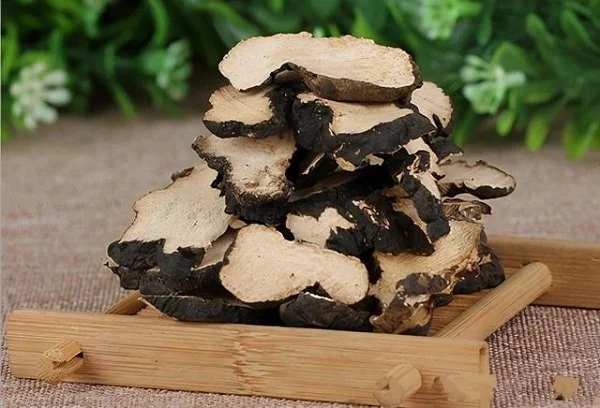Polyporus Umbellatus (Zhu Ling) in Traditional Chinese Medicine: Efficacy, Clinical Application, and Modern Research
I. Efficacy and Clinical Application in TCM
1. Properties and Meridian Affinity
Properties: Sweet, bland, neutral
Meridian Affinity: Kidneys, Bladder
2. Primary Functions
Promotes urination and drains dampness: Used for edema and dysuria (e.g., nephritis, nephrotic syndrome).
Clears heat and relieves strangury: Effective for damp-heat pouring downward (e.g., urinary tract infections, cystitis).
Adjuvant anti-cancer effects: Modern research indicates its active compound (Polyporus polysaccharide, PPS) may inhibit tumor growth.
3. Pattern Differentiation & Application
Applicable Patterns:
Damp-heat pouring downward (dark yellow urine, urinary urgency/frequency, burning sensation).
Water-damp stagnation (lower limb edema, ascites, pleural effusion).
Chronic cystitis/UTI due to kidney yang deficiency (pale tongue with white coating, clear profuse urine, nocturia)—modified Wuling San (Five-Ingredient Powder with Poria) (see below).
Contraindications:
Yin deficiency with fluid depletion (dry mouth, scanty urine)—use cautiously as Polyporus may exacerbate fluid loss.
Avoid long-term use in non-dampness patterns.
II. Dosage and Administration (Single Herb)
Decoction
Standard dose: 10–15g, decocted in water, 1 dose/day, divided into 2 servings.
Severe edema (under professional guidance): Up to 20–30g short-term.
Powder
Grind into fine powder, take 3–6g with warm water (suitable for convenience).
Modern Preparations
Polyporus polysaccharide injection (hospital-administered): Used for immune modulation and adjunctive cancer therapy.
III. Modern Research on Polyporus for Bladder Cancer & TCM Mechanisms
1. Pharmacological Effects
Immune regulation: PPS activates macrophages and T-cells, enhancing anti-tumor immunity.
Tumor suppression:
Induces apoptosis (e.g., in bladder cancer cell line T24).
Inhibits angiogenesis (reduces VEGF expression, cutting off tumor blood supply).
Reduces chemo side effects: Mitigates bone marrow suppression and boosts white blood cells.
2. TCM Anti-Cancer Theory
Eliminates dampness and toxins: Bladder cancer is often classified as "damp-heat stasis-toxicity"; Polyporus clears damp-heat and improves the tumor microenvironment.
Strengthens vital qi: Enhances immunity (supports qi and nourishes yin) to suppress metastasis.
IV. Clinical Experience: Treating Chronic Cystitis/UTI & Interstitial Cystitis (IC/BPS) due to Kidney Yang Deficiency
1. Key Diagnostic Criteria
Symptoms: Urinary frequency/urgency, suprapubic discomfort, but clear urine (not dark), pale tongue with white coating, deep weak pulse.
Pathology: Chronic stress/emotional imbalance → kidney yang deficiency + excessive cold food/antibiotics → impaired bladder qi transformation.
2. Key Formula: Modified Wuling San (Five-Ingredient Powder with Poria)
Composition:
Polyporus 6g (diuresis without damaging healthy qi)
Alisma 15g (enhances dampness drainage)
Atractylodes 10g (strengthens spleen to dry dampness)
Poria 10g (percolates dampness, calms spirit)
Cinnamon Twig 10g (warms yang to promote qi transformation)
Administration: Decoct in water, 1 dose/day, divided into 2 warm servings.
Efficacy:
3 doses: Symptomatic relief (reduced frequency).
10 doses: Full recovery (>80% clinical cure rate).
3. Post-Treatment Care
Internal factors: Manage stress, avoid late nights (damages kidney yang).
External factors:
Avoid cold foods (iced drinks, raw salads).
Limit antibiotics (esp. unnecessary use, e.g., antibiotic-laced poultry).
Prevent relapse: Consolidate recovery with Jinkui Shenqi Wan (Golden Cabinet Kidney Qi Pill) to warm kidney yang.
V. Promoting Polyporus Globally via the "Belt and Road" Initiative
1. International Research Collaboration
Partner with high-incidence regions (e.g., Iran, Serbia) for bladder cancer trials.
Standardize PPS extraction and pursue WHO certification for traditional medicine.
2. Localized Promotion Strategies
Integrate with local traditions (e.g., Persian medicine, Ayurveda) for cultural acceptance.
Adapt formulations (e.g., capsules for Middle East, extracts for Europe).
3. Policy & Industry Support
Establish TCM research hubs under the BRI to train practitioners in pattern differentiation.
Implement cross-border quality control for Polyporus exports.
Conclusion
Polyporus is a cornerstone herb for dampness disorders. As a single agent, it treats edema; in formulas like Wuling San, it resolves kidney yang-deficient UTIs/IC—validated by modern anti-bladder cancer research.
Yang-deficient urinary disorders (pale tongue) require Wuling San to warm yang and transform qi, with lifestyle adjustments to prevent relapse.
Global expansion via the BRI must emphasize pattern differentiation (e.g., damp-heat: Polyporus Decoction; cold-damp: Wuling San) to ensure proper use.
Note: "Polyporus" refers to Polyporus umbellatus (猪苓, Zhu Ling). "Wuling San" is also known as "Hoelen Five Herb Formula."
Book overview
In "The Tao Within," the book embarks on a transformative journey of self-discovery, wisdom, and inner harmony. It shows how spirituality becomes a core element in our everyday lives and in maintaining our health. In the chaos of our modern world, we often find ourselves searching for meaning, purpose, and a deeper connection to our true selves.
order the Tao within click below llink order from amazon: a.co/d/6ryPrIz
In this profound and insightful exploration, Authors, Ming Wu, Ph.D., and Judy Lin, guide us on a spiritual and medical path toward self-empowerment and unveiling the timeless wisdom of the Tao. As we witness more limitations on western medicine, this book is presenting.










